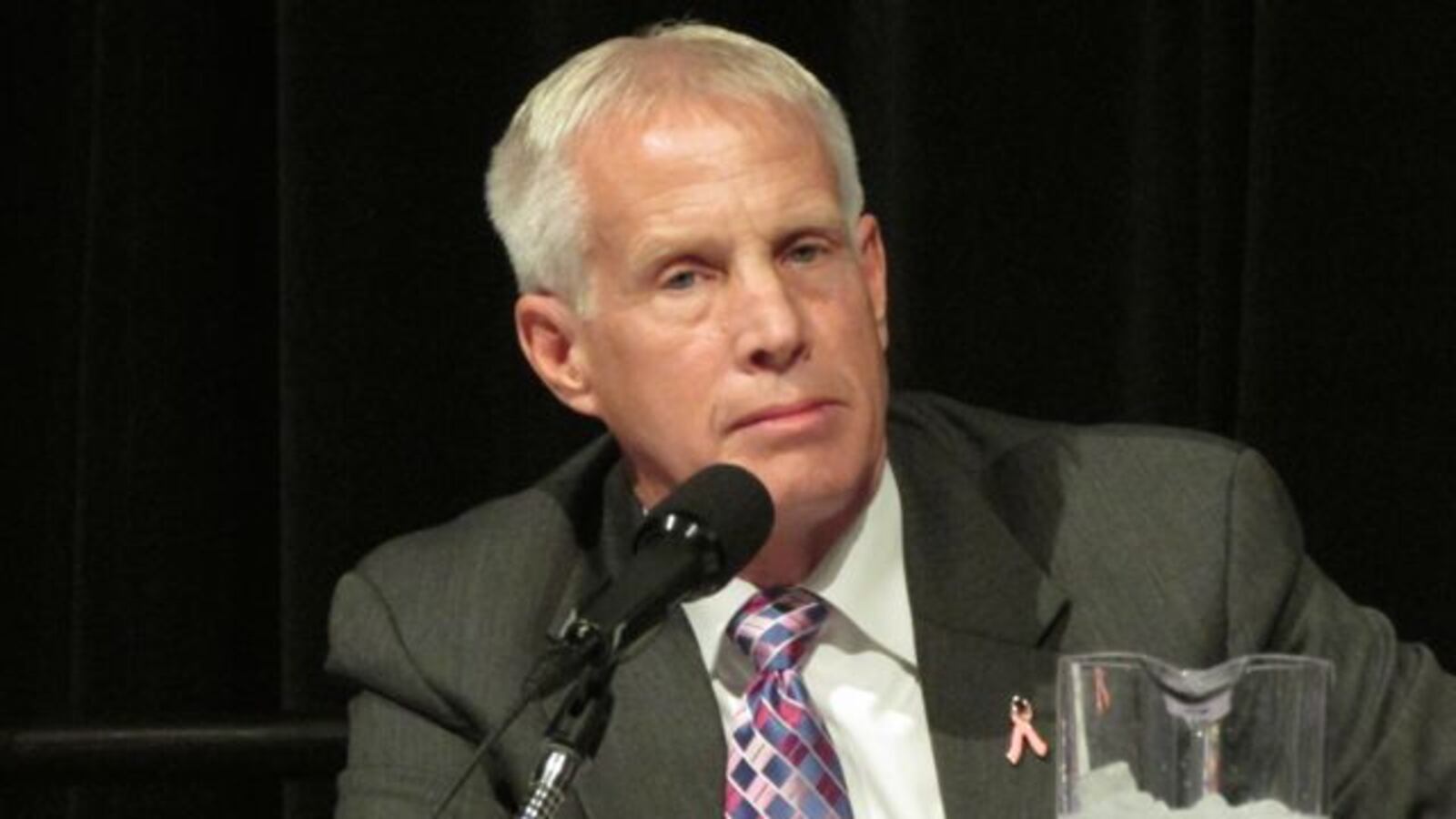One of the Indiana legislature’s most high profile champions of testing, accountability and choice-based education reform is scrambling to save his political career.
But the challenge facing Robert Behning, R-Indianapolis, in today’s primary election doesn’t come from a Tea Party conservative, like the battles some of his Republican statehouse colleagues face.
His opponent, an electrician named Mike Scott, is a union-backed Republican who has taken aim at Behning’s central role in changing education in the state over the past several years as a centerpiece of his case against the incumbent.
Scott argues Behning has supported an agenda that is damaging to public schools by grading them unfairly, tying the hands of local school leaders and taking dollars away to support experiments like charter schools and vouchers.
The unexpectedly close race has raised new questions about the political potency of a coalition of voters, spanning both political parties, that is increasingly skeptical of the sorts of reforms Behning is identified with.
It was voters concerned about too much testing, federal intrusion in local school curriculum, the state’s commitment to supporting public schools financially and what some saw as a derisive attitude toward teachers that helped propel Glenda Ritz’s stunning 2012 upset of then-state Superintendent Tony Bennett.
Could the same sentiments now sweep Behning out of office?
He is taking the threat seriously. Scott garnered only 37 percent of the vote when he challenged Behning in 2012 but a worried Behning went up with television ads critical of Scott last week.
Behning said he doesn’t believe his political problems are true reflection of voter discontent with his education stances. He argues Scott has effectively painted an unfair portrait of his work in the legislature.
Even so, he said, the race could have an impact on efforts to make educational change in the state.
“If I lose tomorrow, it really wouldn’t be because of education reform,” he said Monday, “although education reform would take a huge hit by taking out Bennett and then taking out me.”
Scott, on the other hand, thinks voters are finally asking tough questions about the direction the state has been led in education under former Gov. Mitch Daniels, Bennett and Behning.
“Bob over the past two years has done some things people do not want,” Scott said. “I never would have supported the agenda that has been started back in 2005 or so that was put in place to actually defund public education. That’s really what’s happening.”
A key role in educational change
For 22 years, Behning has represented the 91st House district, including Decatur Township, southwest Marion County and parts of Morgan and Hendricks counties. For six of those years, he chaired the House Education Committee.
In that role, Behning helped shepherd through the legislature bills to support the education agenda pushed by Daniels and Bennett. That led to new laws that created private school vouchers, expanded charter schools and instituted teacher evaluation. He was also an early backer of Common Core standards.
His vocal support for those ideas, along with A to F school grading and accountability based on testing, made Behning a lightning rod for critics, and they have rallied to support Scott.
Scott, who estimated his campaign has knocked the doors on about 85 percent of the homes in the district, said voters have been receptive to his candidacy and his complaints about Behning.
Behning’s own polling has consistently shown him in the lead, he said, but by smaller margins than he expected. He declined to say how close the race was in his polls.
Behning said he has been targeted by mailings from third party groups and responded with a flurry of fundraising in the campaign’s final month. Last week he began running the T.V. ads and he was campaigning door to door on Monday.
Behning’s view is that Scott and his allies have painted him unfairly as a big spending, big government liberal.
“They’re trying to say I’m a liberal who wants the federal government to take control of our schools,” he complained. “Those are some of the most untrue things.”
Finding a compelling message
But what has changed since Behning trounced Scott in the primary two years ago?
Scott looks no further than Decatur Township schools. Smack in the middle of Behning’s district, Decatur schools have been hit hard by property tax caps, instituted by the legislature in 2010 as part of an effort to make property taxes more stable. A byproduct of that change was limits on the flexibility schools once had to manage their finances.
For Decatur and a few others, the consequences have led to tough choices. The district today is seeking $27 million from voters, saying it will be forced to cut busing altogether if the referendum fails.

Scott has done all he could to get voters coming out to support the school referendum to blame Behning for the district’s fiscal woes.
What’s happening to Decatur schools, Scott said, is connected to a wider effort that began under Daniels, and includes vouchers and charter schools that drain money from public school districts, to put a squeeze on funding for local schools.
“People want their pubic schools,” Scott said. “Bob is going against them. He has not listened to them.”
Assisting Scott in getting that message out has been Hoosiers for Public Education, a political action committee that backs public schools. Joel Hand, one of the PAC’s organizers, said the group targeted Behning as a chief opponent of its philosophy, which calls for local control paired with strong state financial support of local schools and blames school choice and Bennett-style accountability systems as diminishing both.
“He has, in the opinion of our board, consistently attacked public education in supporting private education through his support of vouchers,” Hand said.
The group has gained some momentum by highlighting Behning’s support for Common Core, academic standards that 45 states agreed to follow in an effort to ensure that graduates are ready for college and careers.
“Until about the last six months he was probably the leading legislative advocate in favor of Common Core,” Hand said. “More recently he’s changed his tune.”
Indiana has seen an intense backlash against its 2010 adoption of Common Core, which led to bills that paused implementation of the standards in 2013 and voided Common Core in Indiana this year.
While Behning voted for Common Core as a member of the Education Roundtable in 2010 and sought to protect it in the legislature the past two years, he notes he ultimately voted for the bills pausing and then voiding Common Core.
“That doesn’t make me look as bad, but they didn’t share all those facts,” Behning said.
Mud flies in campaign’s final weeks
Behning insists his record has been misrepresented, and he defined his television ads, which Scott has called “attack” ads, as fair and necessary to inform voters who know little about Scott.
“In primaries, you have your more conservatives come out,” Behning said. “People didn’t have a clue who he was.”
The ads highlight Scott’s union connections.
“This district would not support a union-backed opponent,” Behning said.
Behning has benefited from a flood of contributions, especially from business interests. Among his recent benefactors are Hoosiers from Economic Growth, which gave him $45,000, and the Indiana Chamber of Commerce-backed political action committee, which gave him $25,000.
But Behning said he regretted his campaign didn’t get more aggressive sooner.
“One thing we probably didn’t do is respond as quickly as we could have on some things,” he said.
Still, Robert Vane, a Republican political strategist, said Behning was smart to recognize the seriousness of his political challenge before it was too late.
Indiana has seen a string of insurgent victories that began with Brent Waltz’s Republican primary upset win over powerful Senate Finance Committee Chairman Larry Borst in 2004, Vane said. Since then, Senate President Bob Garton was defeated by Greg Walker in 2006, Indianapolis Mayor Bart Peterson was shocked by Greg Ballard in 2007, Bennett was defeated by Ritz in 2012 and U.S. Sen. Dick Lugar lost in the primary to Richard Mourdock, also in 2012.
In each case, Vane said, part of the problem was incumbents failing to recognize that their challengers were credible threats.
Vane said his he knows Behning’s district well. His parents live there. Scott’s populist strategy makes good sense for Decatur Township voters, he said.
“Thats a working class district,” Vane said. “It’s not Zionsville or Carmel. It’s working class Republicans.”
He’s not convinced Behning’s struggles can be blamed solely on his education record, or that Behning will actually lose today.
“I’ve seen nothing that indicates school reform is anything less than very popular in Indiana,” Vane said. “Do I think Scott has a smart strategy? I do. But I wouldn’t bet against Bob Behning and the school reform movement either.”

